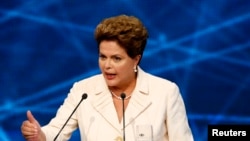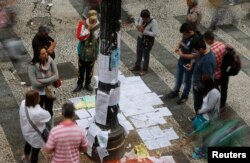Brazil suffered a recession in the first half of the year as investment plunged and the country's hosting of the World Cup suffocated economic activity, a major blow to President Dilma Rousseff's already diminishing hopes for reelection in October.
Latin America's largest economy has suffered stagnant growth for more than three years under Rousseff's left-leaning policies, which have dented consumer and business confidence and caused heavy losses for financial investors.
The economy took an even bigger downturn in the second quarter, contracting 0.6 percent from the first quarter, according to government statistics agency IBGE. The agency also revised down its estimate for first quarter activity to a 0.2 percent contraction, meaning the economy entered a recession.
News of the recession, Brazil's first since the global financial crisis of 2008-09, will give a powerful weapon to Rousseff's opponents in the Oct. 5 election at precisely the moment that her candidacy is at its most vulnerable.
Polls over the last week have shown Rousseff falling behind centrist candidate Marina Silva in the event of a second-round runoff, which appears likely. Silva and the other main candidate, Senator Aecio Neves, have hammered Rousseff for being weak on inflation and ruining the economic momentum that made Brazil a Wall Street darling last decade.
Civil construction and manufacturing especially suffered during the second quarter, data showed. Brazil hosted the World Cup in June and July, which caused a slowdown at many factories and retailers as cities declared public holidays on game days to prevent logistical problems such as heavy traffic.
Yet economists said Brazil's problems go beyond any short-term considerations such as the Cup. They blamed government policies that have relied too much on stimulating domestic demand while failing to attract investment.
They said the data underscored that the next president - whoever it may be - would need to undertake deep reforms.
“The recovery from here will be slight,” said Eduardo Velho, chief economist at INVX Global, an investment fund in Sao Paulo. “We need a new economic program based on fiscal tightening, monetary flexibility, and improvements in productivity.”
Investment plummeted 5.3 percent in the second quarter compared to the previous quarter, its worst performance since early 2009. Industry also suffered its fourth straight quarterly decline, down 1.5 percent.
Following the data, some economists said they would revise down their forecasts for full-year economic growth to zero.
Rousseff has blamed the slowdown on continued economic weakness abroad, such as in Southern Europe.
The second quarter contraction was worse than expectations of a 0.4 percent contraction, according to the median forecast of 47 analysts polled by Reuters.






